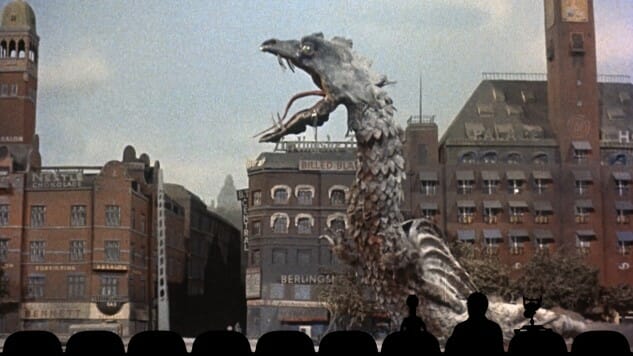MST3K: Reptilicus is a Promising but Uneven Reboot of a Beloved Show

How do you reboot a classic? How do you take one of the greatest cult TV shows of all time and present it in a new format that is both relevant and respectful? How do you keep the MST3K in a new version of Mystery Science Theater 3000? How do you please the sort of fan who would write a 47,000 word ranking of all 177 original MST3k episodes, as recently appeared on Paste?

After watching two preview episodes of Shout! Factory’s new MST3K series on Netflix, I can report the following: The show’s new creative team is off to a strong start in what is officially being called “season 11.” Both episodes, Reptilicus and Cry Wilderness, have some rough patches and aspects that can still be refined, but we’re talking about a reboot to a series that also tended to vary wildly in its comic sensibilities and ability to execute them from episode to episode. MST3K has always been both variable and extremely subjective, and the show’s first two episodes prove no exception.
Before we dive into the Reptilicus premiere, allow me to run through how this new series chooses to establish its presentation.
— New host Jonah Ray is playing “Jonah Heston,” another Gizmonic Institute employee in the mode of Joel who is captured by Kinga Forrester (Felicia Day) and TV’s Son of TV’s Frank (Patton Oswalt, also known simply as “Max”) and shot up into the Satellite of Love. He’s joined by the robots that any fan of the show would know: Tom Servo (Baron Vaughn), Crow T. Robot (Hampton Yount) and Gypsy (Rebecca Hanson, who also plays kooky Pearl Forrester clone “Synthia”).
 Jonah is brought to Moon 13 in the show open.
Jonah is brought to Moon 13 in the show open.
— The new opening sequence/update to the MST3K Love Theme is absolutely knocked out of the park by band leader Har Mar Superstar, who has been a Paste/Daytrotter favorite for years—truly an inspired choice that I didn’t see coming. He leads the “Skeleton Crew,” who function as Kinga’s grunts/house band. At one point they’re clearly playing a riff on the “Wild Rebels Cereal” theme from Ep. 207, Wild Rebels, which filled me with delight.
— This truly is considered a continuation rather than a true remake. All the previous characters such as Joel, Mike and Dr. Forrester still exist in this shared universe, and the opening labels the episode as “198,” which means they’re including the 22 original episodes on Minneapolis local station KTMA (but not MST3K: The Movie). The KTMA season is apparently “season 0” as a result.
— Just watching the credits for Reptilicus, you can mine a whole lot of interesting information. Writing credits include the likes of Dan Harmon and Justin Roiland of Rick and Morty, Patton Oswalt’s brother/fellow comedian Matt Oswalt, and former MST3K writer and oft-time supporting actor Paul Chaplin, among others. Joel Hodgson is credited all over the place: Writer, director (along with Robert Cohen), and actor as “Ardy,” who I’m assuming is one of Pearl’s henchmen, but I can’t exactly place who he is, which means he’s probably masked.
— Many aspects of the Joel era, such as the Invention Exchange, have returned relatively unchanged. Jonah’s invention in this episode is the geisha-esque “bubble fan,” which isn’t particularly memorable.
Reptilicus Review
-

-

-

-

-

-

-

-

-

-

-

-

-

-

-

-

-

-

-

-

-

-

-

-

-

-

-

-

-

-

-

-

-

-

-

-

-

-

-

-

 Peterson, clown prince of janitors
Peterson, clown prince of janitors






































